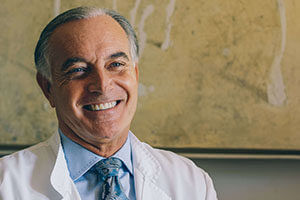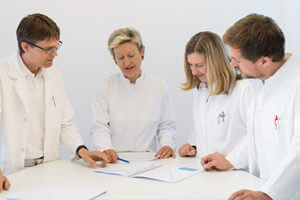THE LATEST REVIEW ON FASTING, THE GUT MICROBIOME & THE GUT MORPHOLOGY
What are the effects of fasting on the intestinal ecosystem?
Relevance of the review
Überlingen, 06.04.2023 – In order to explore this topic, research teams from the Buchinger Wilhelmi Clinic (Überlingen, Germany), the European Molecular Biology Laboratory (Heidelberg, Germany), and the CNRS Hubert Curien Pluridisciplinary Institute (Strasbourg, France), led by Dr. Robin Mesnage, have published on the 06.04.2023 in Trends in Microbiology a review on the effects of fasting and nutritional strategies called “Remodeling of the intestinal ecosystem during caloric restriction and fasting”. For the first time, a review in a leading journal integrates what is known about the effects of long-term fasting on the gut microbiome as well as the morphological changes of the intestinal tissue.
This review sheds light on the mechanisms underlying the observation of long-term fasting benefits made since decades in the Buchinger Wilhelmi fasting clinics.
The role of the gut microbiome
The collection of microorganisms inhabiting the human intestine, known as the gut microbiome, plays an important role in digestion, immunity, emotional well-being and overall health. The food we eat has a large impact on gut microorganisms like thousands of scientific publications have shown. A balanced diet, rich in fiber and low in processed industrial foods, promotes a healthy microbiome, but we need more knowledge about the effects of the absence of food ingestion and processing during a fasting period.
Some of the key takeaways:
- During fasting, bacteria which are able to survive on intestinal secretions containing mucus or desquamated cells proliferate at the expense of those relying on nutrients from our diet.
- Human studies have focused on fecal samples thereby neglecting intestinal tissue remodeling.
- The profound remodeling of the intestine during fasting leading to a renewal of the mucosa and a decreased inflammatory state is key in restoring a healthy gut microbiome when food is reintroduced after a fast.
- It is still unclear, which relationship the changes in the gut microbiome have with the benefits of fasting.
- The changes in the gut microbiome caused by fasting in humans can be compared with those of free living animals.
Further research is needed
Crucial knowledge gaps include how the microbiome and the intestinal mucosal walls are rebuild after different food reintroduction patterns and how overall calories and specific macronutrients contribute to this process.
This review also led to identifying promising directions for future research by the Buchinger Wilhelmi clinics.
Fasting has profound effects on intestinal regeneration
By focusing on the microorganisms living inside the intestines, many scientists don’t consider the possibility of temporary atrophy followed by an intense regeneration of the gut tissues. This effect could have important therapeutic issues in case of damaged gut. The mechanisms implied are the fasting activation of autophagy and apoptosis to eliminate or recycle all cell structures and the activation of stem cell divisions leading to a global rejuvenation. This anti-inflammatory ecosystem favors the re-colonization by health-associated bacteria when food is reintroduced.
Video on the topic “fasting & gut health”
Conclusion
Our intestinal microbiome is like a garden. If you want to plant beautiful flowers (health-associated bacteria) in a garden where the soil is damaged, and covered by weeds, planting seeds is not enough. The soil needs to be prepared, and fertile, so that a diverse and healthy ecosystem can be restored.
Although this review has only scratched the surface of the topic, one thing is clear: the overstimulation of our digestive system in our chronically fasting deprived society has far-reaching effects. The therapeutic fasting offers a safe non-pharmacological solution to leverage the self-healing potential of our digestive system and can give back to our microbial companions a healthy ecosystem.
Authors
Quinten R. Ducarmon, Franziska Grundler, Yvon Le Maho, Françoise Wilhelmi de Toledo, Georg Zeller, Caroline Habold, Robin Mesnage
Contact
Dr. Robin Mesnage
robin.mesnage@buchinger-wilhelmi.com










